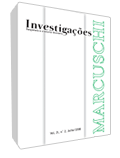O estatuto sociocognitivo do contexto na orientação argumentativa das práticas referenciais
Abstract
Este texto tem o objetivo de discutir o estatuto do contexto na compreensão da orientação argumentativa das práticas referenciais de pessoas afásicas que apresentam alterações em sua capacidade de realizar operações metalingüísticas. Com base na descrição dos movimentos realizados pelos sujeitos no decurso de um episódio interativo com vistas à construção e à negociação do sentido de uma determinada expressão idiomática, procuramos entrever e analisar dois aspectos do percurso (e do papel) sociocognitivo do contexto: incorporação e emergência (cf. Hanks 2008).References
AUTHIER-RÉVUZ, Jacqueline. 1998. As palavras incertas. Campinas: Ed. da Unicamp.
FURLANETTO, Maria Marta. 2001. P-PRIME e produção lingüística: percepção e preconceito. Revista Linguagem em (Dis)curso. (2)1.
HANKS, William. F. 2008. O que é contexto. In: BENTES, A. C.; REZENDE, R. C.; MACHADO, M. A. R. (Orgs.). Língua como prática social: das relações entre língua, cultura e sociedade a partir de Bourdieu e Bakhtin. São Paulo: Cortez.
JUBRAN, C.; URBANO, H.; FÁVERO, L. L.; KOCH, I. G. V.; RISSO, M. S. et alii. 1992. Organização tópica da conversação. In: ILARI, R. (org.). Gramática do Português Falado, 2: Níveis de Análise Lingüística. Campinas: Edunicamp/FAPESP, p. 357-479.
KERBRAT-ORECCHIONI, Catherine. 1996. Texte et Contexte. In: SCOLA. Sciences Cognitives, Linguistique & Intteligence Artificielle 6:40-59. KOCH, Ingedore G.V. 2002. Desvendando os segredos do texto. São Paulo: Cortez.
______. 2004. Introdução à lingüística textual. São Paulo: Martins Fontes.
______.2005. Referenciação e orientação argumentativa. In: KOCH, I. G. V.; MORATO, E.; BENTES, A. C. (Orgs.). Referenciação e Discurso. São Paulo: Contexto.
MARCUSCHI, Luiz Antônio. 2003. Do código para a cognição: o processo referencial como atividade cognitiva. Veredas 13: 43-62.
MONDADA, Lorenza; DUBOIS, Danièlle. 1995. Construction des objets de discours et catégorisation: une approche des processus de référentiation. Berrendonner, A. & M-J. Reichler- Béguelin.Tranel 23: 273-302.
______. 2004. L’analyse de corpus dans la perspective de la linguistique interactionnelle: des analyses de cas singuliers aux analyses de collections. In. CONDAMINE, A. (Ed.), Sémantique et corpus, Paris: Hermès
MORATO, Edwiges M. 2007. Aportes da perspectiva sociocognitiva às ações terapêuticas: a experiência do Centro de Convivência de Afásicos (CCA-Unicamp). In: SANTANA, A. P.; BERBERIAN, A. P.; GUARINELLO, A. C.; MASSI, G. Abordagens grupais em Fonoaudiologia — contextos e aplicações. São Paulo: Plexus.
______. et alli. 2006. Tratamento de dados multimodais em práticas interativas de pessoas afásicas e não afásicas registradas em aúdio e vídeo no Centro de Convivência de Afásicos (Laboratório de Neurolingüística - Instituto de Estudos da Linguagem/Unicamp). Relatório Final — Pesquisa CNPq — Edital Humanas 32.
______. 2005. Metalinguagem e referenciação: a reflexividade enunciativa nas práticas referenciais. In: KOCH, I. G. V.; MORATO, E.; BENTES, A. C. (Orgs.). Referenciação e Discurso. São Paulo: Contexto. SACKS, H.; SCHEGLOFF, E. A; JEFFERSON, G. 1974. A simplest systematics for the organization of turn-talking for conversation, Language 50.
SALOMÃO, Maria Margarida. 1999. A questão da construção do sentido e a revisão da agenda dos estudos da linguagem. Veredas 3(1) 6179.
Downloads
Published
How to Cite
Issue
Section
License
Copyright (c) 2008 Edwiges Maria Morato

This work is licensed under a Creative Commons Attribution 4.0 International License.
Authors who publish with Revista Investigações agree to the following terms:
Authors retain copyright and grant the journal right of first publication with the work simultaneously licensed under the Creative Commons Attribution 4.0 International (CC BY 4.0) license that allows others to share the work with an acknowledgement of the work's authorship and initial publication in this journal.
Authors are able to enter into separate, additional contractual arrangements for the non-exclusive distribution of the journal's published version of the work (e.g., post it to an institutional repository or publish it in a book), with an acknowledgement of its initial publication in this journal.
You are free to:
Share — copy and redistribute the material in any medium or format for any purpose, even commercially.
Adapt — remix, transform, and build upon the material for any purpose, even commercially.
The licensor cannot revoke these freedoms as long as you follow the license terms.
Under the following terms:
Attribution — You must give appropriate credit , provide a link to the license, and indicate if changes were made . You may do so in any reasonable manner, but not in any way that suggests the licensor endorses you or your use.
No additional restrictions — You may not apply legal terms or technological measures that legally restrict others from doing anything the license permits.

